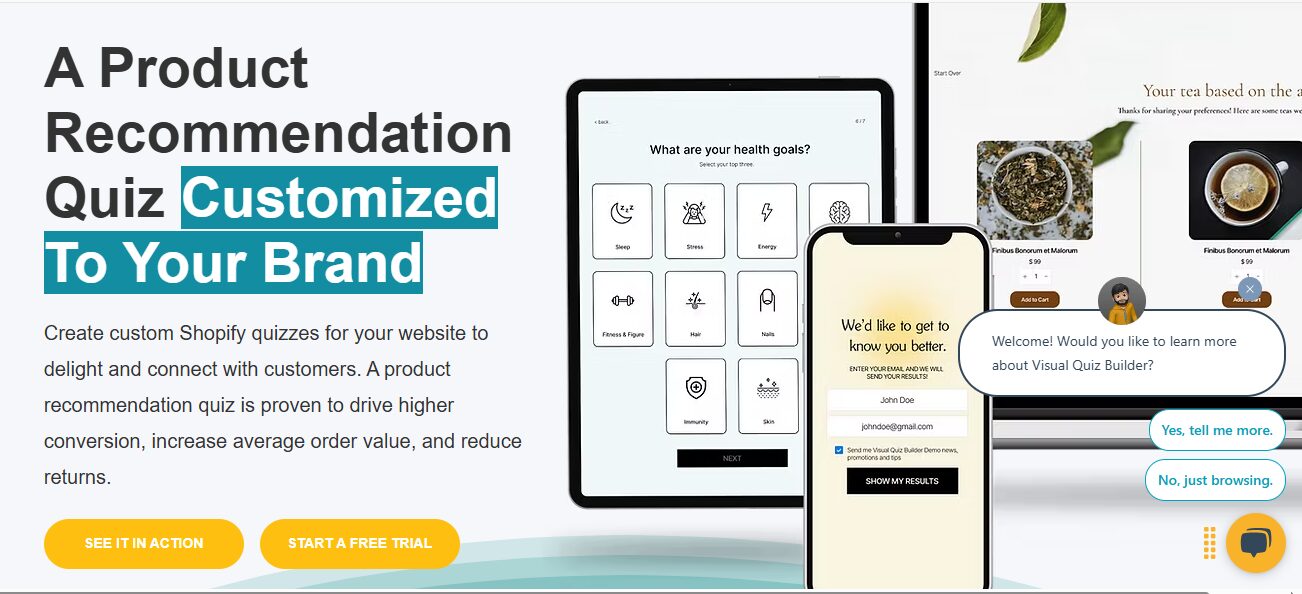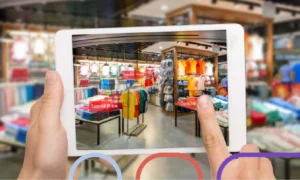Every Shopify store should use a product quiz because it dramatically increases conversion rates, reduces cart abandonment, eliminates customer decision paralysis, and provides invaluable customer data—all while creating a personalized shopping experience that builds trust and drives sales.
In today’s competitive e-commerce landscape, Shopify merchants need innovative ways to engage visitors and increase conversions. The product quiz has emerged as a powerful solution that guides customers to their perfect purchase while providing valuable business insights.
The concept of a shopify product quiz has evolved dramatically, becoming an essential component of successful e-commerce strategies that help businesses overcome common challenges like high bounce rates and overwhelming choice paralysis.
The Evolution of Online Shopping Behavior
Consumer behavior has shifted significantly over the past few years. Modern shoppers expect personalized experiences that mirror the attention they would receive in a physical store. They want guidance, recommendations, and assurance that they’re making the right choice. This is where product quizzes shine, bridging the gap between impersonal online browsing and the personalized service of traditional retail.
Research shows that consumers express significant frustration when their shopping experience feels impersonal. They crave connection and relevance, not just product listings. A well-designed product quiz shopify integration can transform the shopping journey from a potentially overwhelming experience into an engaging, personalized adventure that leads customers directly to products they’ll love.
The challenge many Shopify store owners face is that their product catalogs have grown extensive, sometimes featuring hundreds or thousands of items. While variety is generally positive, it can create decision fatigue for customers who struggle to navigate through numerous options. Product quizzes solve this problem by acting as intelligent filters, using customer preferences and needs to curate personalized product recommendations.
Understanding the Psychology Behind Quiz Engagement
The effectiveness of shopify product recommendation quiz tools lies in their psychological appeal. Humans are naturally curious creatures who enjoy interactive experiences, especially when those experiences provide value. Quizzes tap into this intrinsic motivation by making the shopping process feel more like entertainment than a chore.
When customers take a quiz, they’re actively participating in their shopping journey rather than passively browsing. This engagement creates a sense of investment in the outcome, making them more likely to trust and act on the recommendations they receive. The interactive nature of quizzes also triggers the completion bias—once someone starts a quiz, they’re psychologically motivated to finish it and see their results.
Furthermore, quizzes provide immediate gratification. Customers receive instant, personalized recommendations based on their specific inputs, creating a sense of discovery and excitement. This emotional engagement is crucial for building the connection that often leads to purchase decisions and brand loyalty.
Key Benefits of Implementing Product Quizzes
Incorporating a Shopify product quiz offers more than just recommendations—it drives strategic advantages that boost business success:
- Enhanced Customer Experience: Quizzes guide shoppers through decisions, reducing guesswork and building confidence with personalized suggestions.
- Increased Conversion Rates: Tailored recommendations help match customers to products they truly want, leading to higher purchase rates.
- Valuable Data Collection: Each quiz response reveals customer preferences and pain points, providing insights for inventory, marketing, and product decisions.
- Targeted Email Marketing: Quiz results allow automatic segmentation for personalized follow-up campaigns, increasing relevance and engagement.
These benefits combine to improve sales, customer loyalty, and business intelligence over time.
Types of Product Quizzes That Drive Results
Different quiz formats serve various business objectives and customer needs. Understanding these formats helps store owners choose the most appropriate approach for their specific industry and customer base.
Diagnostic quizzes focus on identifying customer problems or needs before recommending solutions. These work particularly well for businesses selling products that address specific issues, such as skincare, supplements, or technical equipment. By understanding the customer’s situation, these quizzes can recommend precisely the right products to address their concerns.
Style and preference quizzes are popular in fashion, home decor, and lifestyle industries. These quizzes explore aesthetic preferences, lifestyle factors, and personal taste to recommend products that align with the customer’s individual style. They’re particularly effective for businesses with diverse product ranges where personal preference plays a significant role in purchase decisions.
Compatibility quizzes ensure that recommended products work well together or suit the customer’s existing setup. These are common in technology, automotive, and home improvement sectors where product compatibility is crucial for customer satisfaction and reducing returns.
Lifestyle assessment quizzes take a holistic approach, considering various aspects of a customer’s life, habits, and goals to recommend products that fit seamlessly into their routine. These comprehensive quizzes work well for businesses selling products that become part of customers’ daily lives, such as fitness equipment, meal planning services, or productivity tools.
Essential Features of Effective Quiz Design
Creating a successful product quiz requires attention to key design elements that influence user experience and business outcomes.
Question flow should follow logical progression, building upon previous answers to create a cohesive narrative. Each question must feel necessary and relevant, avoiding redundancy. The best quizzes feel conversational, like a knowledgeable salesperson asking thoughtful questions.
Visual design significantly impacts completion rates. Clean, attractive interfaces with consistent branding encourage participation and build trust. Images, progress indicators, and clear typography create a professional appearance.
Question variety keeps quizzes engaging while gathering comprehensive information. Mix multiple-choice questions with image selections, sliding scales, and yes/no options to prevent monotony. However, clarity remains paramount—every question should be easy to understand and answer.
Personalized results go beyond listing recommended products. Effective quizzes explain why specific products were chosen, addressing customer responses and demonstrating the connection between their needs and recommended solutions. This builds confidence and helps customers understand the value proposition.
Implementation Strategies for Maximum Impact
Successfully implementing a product quiz shopify solution requires strategic planning and attention to multiple factors that influence both user adoption and business results.
Placement strategy significantly affects quiz visibility and completion rates. The most effective approach often involves multiple touchpoints throughout the customer journey. Homepage placement captures visitors early in their browsing experience, while product page quizzes can help customers choose between similar options. Exit-intent popups can re-engage visitors who are about to leave without making a purchase.
- Homepage hero section integration for immediate visibility
- Collection page placement to help navigate large product catalogs
- Product page integration for variant selection and complementary recommendations
- Cart page placement to suggest additional relevant items
- Email campaign integration to re-engage previous visitors
- Social media promotion to drive traffic and engagement
- Blog content integration to provide value-added shopping assistance
Mobile optimization cannot be overlooked, as mobile commerce continues to grow. Quiz interfaces must work seamlessly across all devices, with touch-friendly controls and responsive design that maintains functionality regardless of screen size. Mobile users often have shorter attention spans, so mobile-optimized quizzes may need to be more concise while still gathering essential information.
Integration with existing marketing tools amplifies quiz effectiveness. Connecting quiz results with email marketing platforms, customer relationship management systems, and analytics tools creates a comprehensive view of customer behavior and enables sophisticated follow-up strategies.
Measuring Success and Optimization
Tracking the right metrics ensures that your shopify product recommendation quiz delivers measurable business value and provides insights for continuous improvement.
Conversion rate tracking should compare visitors who take quizzes versus those who don’t, providing clear evidence of quiz impact on purchase behavior. Additionally, tracking the conversion rates of quiz-recommended products versus general site recommendations helps validate the quality of quiz logic and algorithms.
Completion rates indicate quiz engagement and user experience quality. Low completion rates often signal issues with question flow, quiz length, or technical problems that need addressing. A/B testing different quiz versions can help identify optimal question sequences and formats.
Customer feedback and satisfaction metrics provide qualitative insights that complement quantitative data. Post-purchase surveys can reveal whether customers felt their quiz recommendations were accurate and helpful, informing future quiz improvements.
The following metrics deserve regular monitoring:
-
- Quiz completion rate and drop-off points
- Conversion rate of quiz participants versus non-participants
- Average order value differences between quiz users and general visitors
- Customer satisfaction scores for quiz-recommended products
- Email engagement rates for quiz-based segments
- Return customer rates among quiz participants
Common Challenges and Solutions
While product quizzes offer significant benefits, implementation isn’t without challenges. Understanding potential obstacles and their solutions helps ensure successful deployment.
Technical integration complexity can overwhelm store owners, particularly those without extensive technical experience. Choosing user-friendly quiz platforms with strong Shopify integration capabilities and comprehensive support resources helps minimize this challenge. Many modern quiz solutions offer drag-and-drop interfaces and pre-built templates that require minimal technical knowledge.
Maintaining quiz accuracy as product catalogs change requires ongoing attention. Automated systems that sync quiz logic with inventory management help ensure recommendations remain current and available. Regular quiz audits should verify that product mappings remain accurate and that discontinued items don’t appear in results.
Balancing comprehensive data collection with user experience presents an ongoing challenge. While detailed customer information enables better recommendations, lengthy quizzes may discourage completion. The solution lies in prioritizing the most impactful questions and using progressive profiling to gather additional information over time through multiple interactions.
Final Thoughts
Implementing a shopify product quiz is a strategic investment in customer experience and conversion optimization. The evidence is compelling: improved conversions, enhanced customer satisfaction, valuable data collection, and competitive differentiation all contribute to stronger business performance.
Success requires commitment to ongoing optimization and willingness to adapt based on customer feedback. As we progress through 2025, the question isn’t whether your Shopify store should implement a product quiz—it’s how quickly you can deploy this powerful tool to start benefiting from improved customer engagement and increased sales.
The future of online retail belongs to stores that blend technology with personalization. Product quizzes represent this balance perfectly, offering scalable automation with the personal touch customers crave. Your customers are ready for a more personalized shopping experience—the question is whether your store is prepared to deliver it.



































